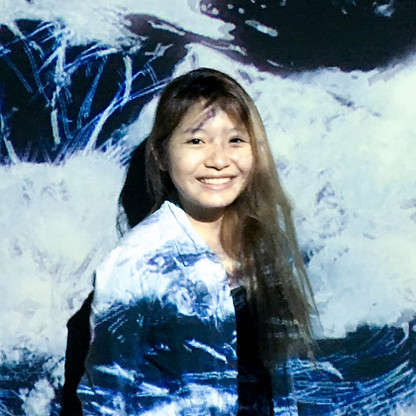
KOH Joanne
Postdoctoral Fellow
The brain is the most mysterious and fascinating biological structure as its function affects not just our physical health but also our perceived idea of self, and how we behave. This also collectively impacts how we function in a community and greater society. It is for these reasons that I have gravitated toward neuroscience as a biology student.
I had the opportunity to practice and complete my doctoral studies in the lab of Prof. Soong Tuck Wah where I worked on understanding how calcium channel signalling regulates both circadian behaviour and metabolism.
As a research fellow, my current research interrogates ionotropic serotonergic signalling in the circuitry of social memory. For this, I mainly use electrophysiological, behavioural and molecular tools.

Jai POLEPALLI
I am a synaptic biologist and a voltage-clamp aficionado who uses a combination of tools and techniques to understand the functional architecture and diversity of excitatory synapses on various types of neurons across different brain regions.

Balagangadharan. K
Postdoctoral Fellow (2024- )
My enduring passion for scientific research and my keen interest in human health have been the driving forces behind my academic pursuits. I am a material scientist by training. My passion for understanding the complexities of the brain and its functions, combined with a deep desire to support those impacted by neurodegenerative diseases, has driven me to focus my studies on neuroscience.
My future career objective is to investigate the core mechanisms of neuronal synaptic and circuit functionality in neuropsychiatric disorders.

GOH Zi Ning Louise
I developed an interest in neuroscience after spending a few months at Lund University, Sweden, during my undergraduate years. Despite the increasing advances in science and technology through the decades, and the leaps made by scientists in uncovering new insights into the brain and its function, there is still much that we do not know about this enigmatic system – that is what captivated me about the field, and led me to pursue a career in neuroscience research.
Currently, my graduate research is focused on determining the contributions of cell adhesion molecules in the synaptic processes of various regions of the brain implicated in learning and memory. With deeper knowledge of the roles, functions and recruitment of different protein classes and subtypes at the synapse level, we can better understand the underlying circuitry and behaviour patterns at a normal cognitive state, and in neuropsychiatric diseases.
PhD student (2020-)
![Yuhui Lin Picture[67].jp2](https://static.wixstatic.com/media/681a77_e277c28a23a84adbb2c844906bfcef96~mv2.jpg/v1/fill/w_296,h_400,al_c,q_80,usm_0.66_1.00_0.01,enc_avif,quality_auto/Yuhui%20Lin%20Picture%5B67%5D_jp2.jpg)
LIN Yuhui
Visiting professor (2025-)
Despite significant progress in the diagnosis and treatment of neuropsychiatric disorders, existing treatments still cannot cure patients. My research interest is to explore the molecular and neural circuit mechanisms underlying neuropsychiatric disorders and design novel drugs based on the uncovered potential targets. I hope my research can provide safe and effective medication and relieve the pain of patients with neuropsychiatric disorders.

Mukta TASHILDAR
Ph D student (2025- )
Replicating human neuronal dysfunction in rodents and witnessing the behavioural changes associated with it is what motivated me to pursue a career in neuroscience.
As a part of my graduate research, I am working on exploring the synaptic mechanisms mediating social learning and memory. As I progress further I want to establish a better understanding of the intricacies of the brain, and its processes.

Archita Barman
Research Assistant (2024-)
I am captivated by the complexity of the natural world and the enigmas awaiting discovery. From my early enthusiasm about the mystery behind the Bermuda Triangle to my current interest in the intricate mechanisms of the human brain, my journey in science has been marked by continuous exploration and curiosity. It is not just the love of science that kindles my interest in these stories - along the way - I have developed a profound appreciation for the technical intricacies underlying the functioning of molecules and electrical impulses within the brain, which give rise to our cognitive abilities.
My interest in neuroscience was further sparked by the allegorical insights of the neurologist Dr Oliver Sacks concerning cognitive phenomena. With the human brain's staggering complexity—100 billion neurons and extensive wiring of neural pathways, it stands as the most complex entity in the known universe. Embarking on this new phase of my neuroscience venture, I am eager to explore the intricate intersections between various disciplines that contribute to the understanding of this remarkable organ.

Leo Polepalli
I pull pipettes. I like percussion.
I don't know why my parents bicker about voltage clamp - that doesn't make any sense to me.

Vincent (Tianchu) Xiong
Research Assistant (2025- )
Life is amazing and research is stimulating. So, becoming a member conducting studies in life sciences fulfills my life. Interestingly, Living creatures can, to varying degrees, learn or remember things, which involves cognition.
Yes, we humans care about this world and ourselves because we have cognition. Figuring out how our brain neuronal networks enable memory formation and learning plays a pivotal role in driving my passion for neuroscience research.
Former lab members
Postdoctoral fellows

LEE Yan Jun
2021-2022
Current position: Scientist, Thermo Fisher

WANG Zhibin
2020-2024
Current position: IACUC, NUS

NG Yi Han
2021-2024
Current position: Instructor, Stanford University
Graduate Students


Vachan Shetru
Visiting scholar (IISER-Pune)
Masters thesis (2023-2024)
Urbi Paul
Visiting Scholar (IISER-Kolkata)
Masters Thesis (2024-2025)
Undergraduate Researchers

BTE SHAIK AHMAD ALLY Amirah
NUS Psychology Undergraduate Student (2021-2022)

Pratik KOPPIKAR
Undergrad exchange student - UT Dallas (2022)


WONG Qing-Ning
Life Science Undergraduate student (2022-2023)
Sriharini S
Life Science Undergraduate Student (2022-2023)

KHAN Saghir
Life science Undergraduate Student (2021-2023)
Gillian LEE
Life Science Undergraduate Student (2024-2025)
Christina Byun
Life Science Undergraduate Student (2024-2025)

Ananta WAZIR
Law Undergraduate Student (2024-2025)

ZENG Muchu
PhD student (2022-)
Brain is the most elaborate organ in the human body. Studying neuroscience gives me the window to unravel the codes of the brain and how it controls behavior, emotion, and cognition. My graduate research focuses on the brain structure called the nucleus of the lateral olfactory tract (nLOT) and its neurocircuitry. The nLOT is a relatively understudied area of the brain, but recent studies have suggested that it plays a key role in olfactory guided behaviors such as feeding.
To investigate the nLOT, I will be using a combination of electrophysiological, imaging, and molecular techniques in rodent models. My goal is to identify the key neural circuits and molecules that drive behaviors and to understand how these circuits are modulated by different stimuli.

May HO
MSc student (2023-)
I am curious about how environment shapes behaviour and this led to my interest in neuroscience. I am interested in understanding the mechanisms of how brain functions, and how certain dysregulations lead to the development of neuropsychiatric diseases. I have previously worked in the lab of Prof. Suresh Jesuthasan investigating habenula function using zebrafish as a model organism. My Honours project was done in the lab of Prof. Soojin Ryu, studying the effects of Early Life Stress on the zebrafish hypothalamus and feeding behaviour.
My current research goal as a Master's student is to investigate the molecular and synaptic mechanisms underlying sociability and social memory.
Research Assistants


